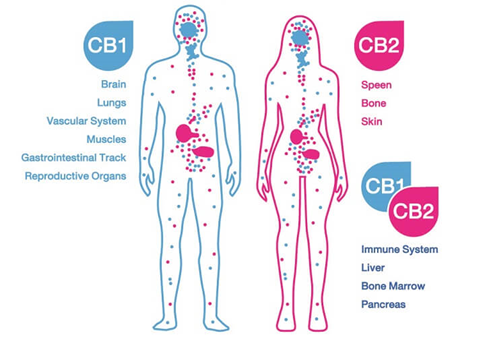
Does CBD Treat Depression?
Cannabidiol – often abbreviated as CBD – is a truly remarkable, powerful molecule of the cannabis plant that has dozens of potential health benefits in

First-time CBD users understandably have a lot of questions – and, sometimes, reservations – regarding what they’ll experience the first time they try CBD.
Here, we’ll endeavor to prepare you for what to expect and how you can make your CBD journey as rewarding and fulfilling as possible.
CBD stands for cannabidiol, the name for one of the most well-studied of over 100 compounds unique to the cannabis plant (called cannabinoids).

Once it is ingested – whether orally through the stomach, smoked, or vaporized – CBD begins to interact with the endocannabinoid system (ECS) by way of the CB1 and CB2 receptors located throughout the body, in virtually every major organ and gland.

These multiple and diverse physiological interactions lend CBD its potent health-promoting and anti-aging benefits (see later section for more information).
When you’re browsing our Sympleaf online store for various CBD products, you’ll likely notice that products are often labeled either “full-spectrum” or “isolate.”
Here are the key differences:
From a health perspective, full-spectrum CBD delivers maximum benefits via a phenomenon called the “entourage effect” in which the various compounds interact to magnify their respective health effects:
“Cannabis is not a single compound product but is known for its complicated molecular profile, producing a plethora of phytocannabinoids alongside a vast array of terpenes. Thus, the ‘entourage effect’ is the suggested positive contribution derived from the addition of terpenes to cannabinoids.”
While, for this reason, many CBD users opt for full-spectrum CBD, there might be many reasons that others prefer CBD isolate, such as:
“Some doctors prescribe… FDA -approved CBD isolate… to treat the seizures that these rare forms of epilepsy cause. Their report notes the importance of the drug’s uniform strength and consistent delivery. This can give a person taking Epidiolex the confidence that they are getting the exact dose they need.”
Both CBD isolate and full-spectrum CBD provide significant potential health benefits, which we’ll explore now.
CBD users use the potent cannabinoid for a variety of reasons. Some of the most well-studied health benefits of CBD include:
“Compared to a placebo, CBD significantly reduced anxiety and discomfort in the participants with SAD. In fact, their reduced anxiety levels were comparable to those of the control participants.”
“Administration of oral CBD in addition to routine psychiatric care was associated with PTSD symptom reduction in adults with PTSD.”
As an alternative to pharmaceutical drugs for the treatment of chronic pain and insomnia, “CBD appears to be better tolerated than routine psychiatric medications.” Unlike medications like benzodiazepines (Xanax, Valium, etc.) and powerful opioid painkillers, CBD produces no dependency and has significantly fewer side effects.
Given its incredible safety profile and effectiveness as an alternative to more conventional treatments, CBD is now frequently used in the treatment of:
Side effects resulting from CBD are relatively rare, mild, and easily managed. The Mayo Clinic identifies the following most common side effects of CBD:
Changing doses, trying new delivery methods (for example, vaping instead of ingesting), and adjusting the dosage can go a long way toward mitigating or eliminating side effects.
While another prominent cannabinoid called THC has remained federally illegal, the Food and Drug Administration (FDA) curiously approved a pharmaceutical formulation of CBD called Epidiolex for the treatment of epilepsy in 2018. This often contradictory legal framework governing cannabis and its constituent compounds creates a messy landscape for consumers to navigate.
Let’s briefly touch on the legality of THC. The 2018 Farm Bill legalized cannabis products, including CBD products, that contain less than 0.3% THC, the federal threshold.
Accordingly, CBD products are now fully legal across the United States, including in Georgia, and are subject to regulation by the Food and Drug Administration (FDA).
Therefore, you shouldn’t worry about CBD landing you in hot water with your employer or the legal authorities – provided that you purchase high-quality CBD supplies guaranteed to contain less than 0.3% THC, like the ones we offer at Sympleaf.
Because cannabis use in popular culture is so closely associated with recreational use to produce a “high,” the stoned, motionless figure on the couch eating a bag of Dorito’s is often the first imager that pops into the head of the layperson when they first hear about CBD.
However, CBD does not produce a “high.” Rather, the “high” associated with cannabis use usually results from a totally separate cannabinoid called Delta-9 THC (tetrahydrocannabinol).
In fact, the truth is often the opposite – many CBD enthusiasts rely on sativa CBD products to lend them “get up and go” energy for a highly productive workday:
“As research investigating the benefits of CBD continues, some reports suggest that CBD may also be useful as a stimulant and provide a boost in energy.”(Cannabis products containing more than 0.3% Delta-9 THC currently remain illegal in Georgia, but if you’re looking for recreational legal cannabis that contains this psychoactive ingredient, try our well-reviewed Delta-8 THC products. To learn more about the differences between Delta-9 and Delta-8 THC, check out our blog post on that subject.)

We want our customers to have a fantastic first-time CBD experience. Contact Sympleaf for more information and tips on how to ensure a worthwhile, rewarding CBD experience that produces the health benefits you hope to reap in your own life.

Cannabidiol – often abbreviated as CBD – is a truly remarkable, powerful molecule of the cannabis plant that has dozens of potential health benefits in

Alzheimer’s disease (AD) – along with a host of other neurodegenerative conditions that impact brain health – is nothing short of a public health catastrophe

To date, CBD (“cannabidiol” in long-form) is the single most potent cannabis compound that researchers have isolated to research its potential health benefits. Here, we
Made in Atlanta. © FOOD AND DRUG ADMINISTRATION (FDA) DISCLOSURE These statements have not been evaluated by the Food and Drug Administration. These products are not intended to diagnose, treat, cure, or prevent any disease.